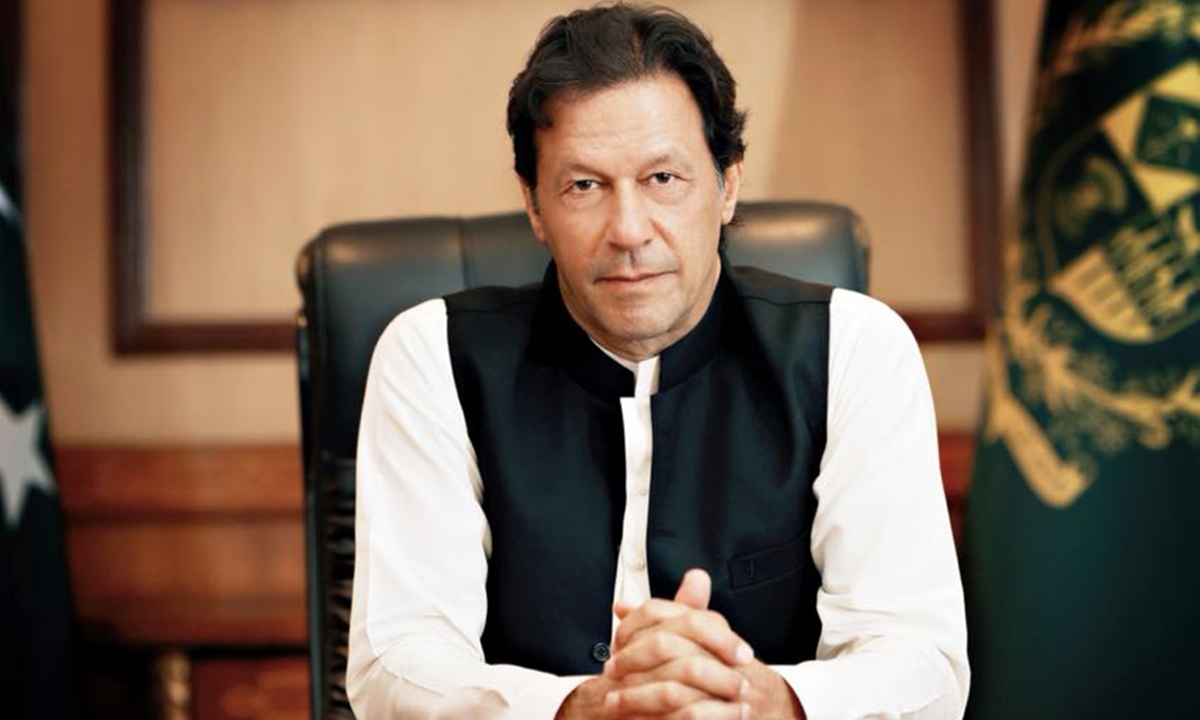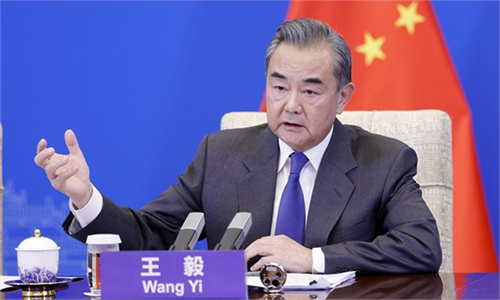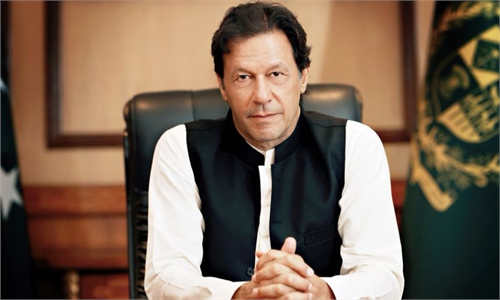
Prime Minister of Pakistan Imran Khan Photo: Courtesy of Embassy of Pakistan in Beijing
Pakistan's 342-member National Assembly announced on Sunday that it passed a motion of no confidence against Prime Minister Imran Khan with the support of 174 members. Khan became the first prime minister in the country's history to be censured through such a motion. Earlier in March, Khan implied that the US was behind the motion against him. Chinese scholars argue that even if the US was playing tricks from behind the scene, it cannot sow discord between China and Pakistan.What is taking place in Pakistan will not impact the country's relations with China in the slightest, Qian Feng, director of the research department at the National Strategy Institute at Tsinghua University, told the Global Times.
"There is no difference between Pakistan's major political parties in their friendship and the all-weather strategic cooperative partnership with China. If there's a difference, it would lie in which party will uphold such relations better," Qian said.
China-Pakistan relations, whether between political parties, peoples or their militaries, have enjoyed a strong historical foundation and will not be disturbed by turmoil. The two countries' relations always move forward firmly regardless of changes in the international landscape.
On March 23, during Chinese State Councilor and Foreign Minister Wang Yi's visit to Pakistan, Wang held a meeting with Chief of Army Staff Qamar Javed Bajwa of Pakistan. On the occasion, Bajwa spoke highly of the high-level strategic cooperation between the two countries, and he praised and expressed support for China's foreign policies.
Since the founding of Pakistan, the Pakistani military has played an important role in the country's politics, Qian noted. In China-Pakistan relations, the Pakistani military has played the role of a stabilizer and ballast stone in building a closer China-Pakistan community with a shared future in the new era. In this context, relations between the two countries will not be affected by Pakistan's domestic political changes.
According to Qian, after Khan leaves office, the two major opposition parties - the Pakistan Muslim League (Nawaz) and the Pakistan People's Party - could become the ruling party. Both parties have a long traditional friendship with China, and this is why Chinese scholars believe the current changes in Pakistan will not affect its relations with China.
Khan previously implied foreign interference specifically from the US against him. Zhao Gancheng, a research fellow at the Shanghai Institute for International Studies, said it is in line with what the US has been doing to other countries in Khan's case as Washington is not satisfied with Khan.
"When the US is unsatisfied with a certain government, it will rope in the oppositions offering promises or money - using these coup-like measures to incite the opposition," Zhao said.
Nevertheless, Qian noted that no matter which party is in power in Pakistan in the future, it should not be labeled as pro-US. "Pakistan has independence in its policies and diplomacy. Even though it may take a balancing strategy among major powers, it will not engage China with such policy. Because the China-Pakistan relationship is so special that it is beyond comparison to Pakistan's ties with any other major powers," Qian said.
As a matter of fact, the US has been trying to drive a wedge between Pakistan and China, but has never succeeded.
In October 2021, China-Pakistan Economic Corridor (CPEC) Authority head Khalid Mansoor accused the US of fake news and "negative propaganda" about the viability of the CPEC. He said the US is inimical to the CPEC but its attempts will fail.
Washington warned Islamabad in November 2019 that "China's going to take a growing toll on the Pakistan economy." Alice Wells, the then US principal deputy assistant secretary of state for South and Central Asian affairs, smeared that "CPEC is not about aid," suggesting the US can bring a better model for Pakistan.
In this regard, Qian said that the US has been futile in trying to affect Pakistan's diplomacy. "The Pakistani people have long seen US pragmatism: Americans cozy up to Pakistan when they think it is useful and cold-shoulder Pakistan when they don't need it. It is futile for the US to try to steer Pakistan, as it is not welcome by any part of Pakistani society," Qian noted.


